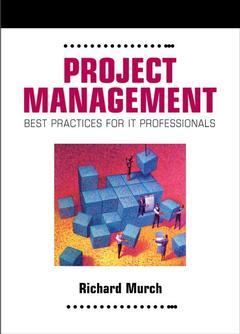Project management: best practices for its professionals
Langue : Anglais
Auteur : MURCH Richard

Project management leadership is todays #1 business skill. Talented, knowledgeable project managers command the best assignments and compensation: they are the future leaders of business. But expert project managers arent born that way: theyve learned specific, proven techniques and strategies for achieving outstanding results. In Project Management, Richard Murch shares those techniques and strategies. Whether youre managing your first project, or youre an experienced project manager facing tough, new challenges, Project Management offers expert solutions.KEY TOPICS:Start by mastering the fundamentals of project management, including planning, reporting, team building, and team leadership. Understand the entire project lifecycle: planning, analysis, design, construction, testing, rollout, and beyond. Learn practical ways to respond to incessant changes in market conditions, resources, requirements and schedules, and learn how to manage risks and problems more effectively. Master todays latest rapid software development methodologies and techniques, and discover how to handle the unique challenges of IT and knowledge management projects. Finally, leverage the latest Internet and intranet-based project management tools and resources.MARKET:For every manager seeking to become a more effective project leader, especially valuable for IT managers called upon to manage rapid software development and deployment to meet business-critical objectives.
I. INTRODUCTION TO PROJECT MANAGEMENT.
1. Evolution of Project Management.
Introduction. Industrial Revolution. Key People in Early Project Management. Other Significant Events. Conclusions.
II. PRINCIPLES OF PROJECT MANAGEMENT.
2. Basic Skills for Project Managers`.
3. Project Planning and Reporting.
4. Project Teams.
Introduction. What Does a Project Manager Do? Necessary Skills. Personal Skills. Technical Skills. Management Skills. Coping Skills. Manage One Project-or Many? Project Management Skills Development. Keys to a Successful Skills Management Endeavor. Conclusions.
3. Project Planning and Reporting.
Introduction. Project Planning Deliverables. Project Standards. How Much Detail? Project Status -An Example. Customer Satisfaction/Follow-On Potential. Conclusions.
4. Project Teams.
Shortages in Information Technology Staff. Need for Retention. The Cost of Information Technology Staff Replacement- An Analysis. Retention-Meeting Needs. Conclusions.
III. THE PROJECT MANAGEMENT LIFECYCLE.
5. Project Lifecycle Overview.
6. Project Planning Phase.
7. Analysis and Design Phases.
8. Construction Phase.
9. Test Planning and Preparation.
10. Roll-out Planning and Implementation Phase.
Introduction. Purpose. Background. Goals. Overview. Lifecycle Process Management. Stakeholders. Audience. Roles and Responsibilities. Revision Process. New Releases. Communication. Section Layout and Structure. Phase Checklists. CRUD-Deliverables Matrix.
6. Project Planning Phase.
Purpose. Objectives. Activities. Initiate Project and Organize. Project Definition and Planning. Management Review and Approval. Roles. Inputs. Information Plan. Outputs. Business Case. Conceptual Design. Project Plan. Milestones. Project Plan Sign-Off. Tools.
7. Analysis and Design Phases.
Analysis Phase. Purpose. Objectives. Activities. End User Requirements. Roles. Inputs. Conceptual Design. Current System Description. Enterprise Model. Information Plan. Outputs. Business Process Prototype. Requirements Specification. Quality Requirements. Milestones. Architecture Analysis Assessment Complete (Optional). Requirements Sign-Off. Tools. Design Phase. Purpose. Objectives. Activities. Quality Verification and Validation (QV&V). Roles. Inputs. Corporate Standards. Business Process Prototype. Requirements Specification. Outputs. Design Document. Milestones. Architecture Design Assessment Complete. Design Sign-Off. Lifecycle Assessment Complete. Tools.
8. Construction Phase.
Purpose. Objectives. Activities. Detailed Design. Programming. Roles. Inputs. Design Document. Outputs. Code. Programming Work Units. Test Database. Unit/String Test Results. Milestones. Code Review Complete. String Test Sign-Off. Tools.
9. Test Planning and Preparation.
Purpose. Objectives. Activities. Design Testing Approach. Plan Test. Create Test Model. Roles. Inputs. The Corporation IT Standards Environment. Conversion Plan. Data Conversion Processes. Design Document. Requirements Specification. Outputs. Automated and Manual Test Procedures. Test Model. Test Plan. Milestones. Test Plan Sign-Off. Testing Phase. Purpose. Objectives. Activities. Roles. Inputs. Outputs. Milestones. Tools. Preparation Phase. Purpose. Objectives. Activities. Roles. Inputs. Outputs. Milestones.
10. Roll-out Planning and Implementation Phase.
Purpose. Objectives. Activities. Design Data Conversion Processes. Complete Rollout and Conversion Plans. Develop Conversion Procedures. Prepare Site. Create Conversion Files. Roles. Inputs. Design Document. Current System Descriptions. Outputs. Conversion Plan. Converted Data. Data Conversion Processes. Rollout Plan. Milestones. Conversion Readiness Sign-Off. Rollout. Purpose. Objectives. Activities. Roles. Inputs. Outputs. Milestones.
IV. PROJECT MANAGEMENT TECHNIQUES.
11. Project Management Methodologies.
Introduction. What Is a Methodology
Date de parution : 11-2000
Ouvrage de 248 p.
17x25 cm
Thème de Project management: best practices for its professionals :
© 2024 LAVOISIER S.A.S.
